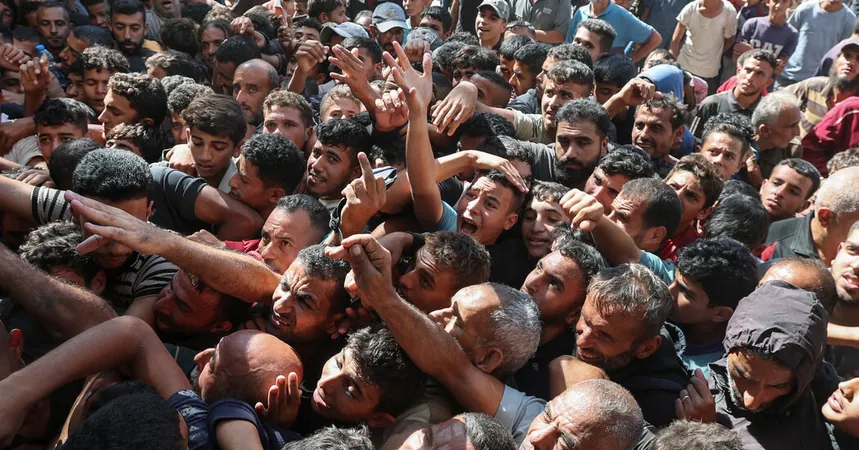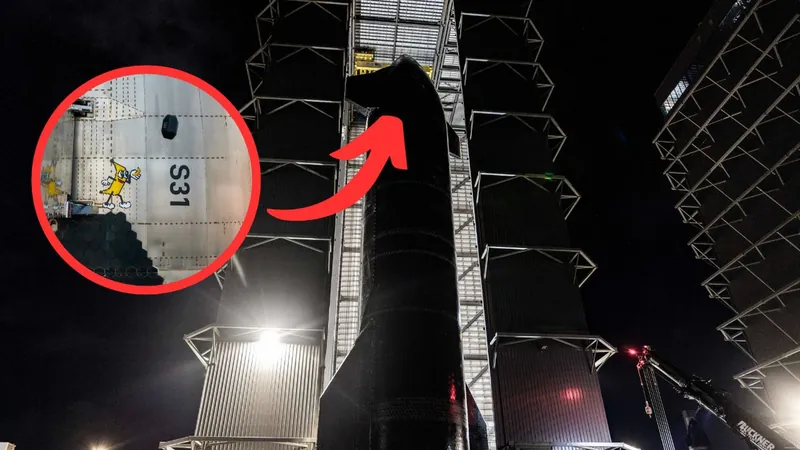
Urgent Call for Action: Famine Looms Over Gaza Amid Rising Tensions
2024-11-09
Author: Lok
United Nations Panel Warns of Imminent Famine
A United Nations-backed panel has issued a dire warning that the threat of famine is accelerating in northern Gaza, coinciding with an ultimatum from the Biden administration for Israel to increase humanitarian aid supplies. As the ongoing conflict stretches into its 14th month, conditions for the 2.2 million residents of Gaza are becoming increasingly critical.
Humanitarian Crisis Worsens
The Integrated Food Security Phase Classification, which includes key relief organizations, stated on Friday that the ongoing war has created 'an imminent and substantial likelihood of famine' due to the rapidly deteriorating situation. Immediate action is required, they stressed, 'within days, not weeks,' to prevent a humanitarian disaster.
Aid Blockages and U.S. Pressure
Just last month, the panel noted an uptick in humanitarian assistance between May and August, but those positive changes have since reversed, leading to a humanitarian crisis. With a deadline set by the Biden administration approaching in mid-November, caution has turned to urgency. The U.S. government demanded Israel enhance the flow of essential aid to avoid potential ramifications on military support.
Official Declaration Complications
Aid organizations have consistently warned of the potential for famine, but the official process to declare such a situation is complex, often muddled by the chaos of war. The local governance in Gaza further complicates matters, with questions remaining over who would formally oversee such a declaration—be it Israel, Hamas, or another entity.
Impact of Israeli Actions on Food Supply
The relentless bombardment and siege imposed by Israel have severely restricted food imports and devastated agricultural and fishing sectors in Gaza. As a result, almost the entirety of the population relies heavily on limited humanitarian assistance for survival. The situation worsened dramatically in early October when Israel halted the entry of all commercial goods into Gaza, impacting essential aid delivery.
Plans to Reopen Aid Channels
In an apparent effort to address these humanitarian needs, the Israeli military announced plans to reopen the Kissufim crossing, which has remained closed since 2005. This crossing, crucial for facilitating aid, connects southern Gaza to Israel, though a timeline for its reopening has not been provided.
Insufficient Aid Response
Since the call for action was made by the Biden administration—demanding the entry of at least 350 aid trucks daily—relief agencies have noted that the response from Israel has remained insufficient. Reports indicate an escalating humanitarian crisis, particularly in northern Gaza, where military operations against Hamas have intensified.
Humanitarian Needs on the Ground
On the ground, the Israeli military recently reported allowing 11 trucks loaded with food, water, and medical supplies into the areas of Jabaliya and Beit Hanoun. However, just 713 trucks had made it to northern Gaza since the beginning of October, a fraction of what is needed.
Rising Starvation and Malnutrition Rates
The United Nations has estimated that up to 400,000 individuals may be trapped in conflict-ridden areas, unable to escape the violence. The same U.N.-backed panel warned that the most alarming scenarios are now being played out in the northern Gaza Strip. Reports indicate that starvation, malnutrition, and diseases linked to inadequate nourishment are on the rise, with famine thresholds possibly already breached.
Urgent Need for International Intervention
'One entire month has seen humanitarian organizations blocked from delivering food to besieged regions in northern Gaza,' said Louise Wateridge, a spokesperson for the United Nations Relief and Works Agency (UNRWA) in Gaza. Approximately 1.7 million individuals—some 80 percent of Gaza’s entire population—did not receive their monthly food rations in October.
Global Focus on Gaza's Deteriorating Situation
As global attention intensifies on the humanitarian crisis, the situation in Gaza continues to deteriorate, leaving the world to ponder the urgent need for coordinated international intervention. Will action be taken before it’s too late? The clock is ticking.





 Brasil (PT)
Brasil (PT)
 Canada (EN)
Canada (EN)
 Chile (ES)
Chile (ES)
 España (ES)
España (ES)
 France (FR)
France (FR)
 Hong Kong (EN)
Hong Kong (EN)
 Italia (IT)
Italia (IT)
 日本 (JA)
日本 (JA)
 Magyarország (HU)
Magyarország (HU)
 Norge (NO)
Norge (NO)
 Polska (PL)
Polska (PL)
 Schweiz (DE)
Schweiz (DE)
 Singapore (EN)
Singapore (EN)
 Sverige (SV)
Sverige (SV)
 Suomi (FI)
Suomi (FI)
 Türkiye (TR)
Türkiye (TR)